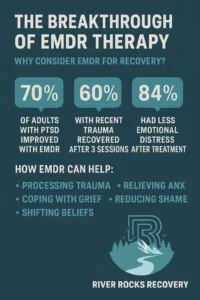You’ve made it farther than you ever thought possible. Sobriety, stability, showing up for your life—day after day. And yet… lately, something’s off. You feel flat. Unmoved. Like you’re watching life instead of living it.
If you’re a long-term alumni feeling emotionally disconnected, EMDR Therapy might be the shift you’ve been waiting for. River Rocks Recovery offers EMDR Therapy in Middletown, Ohio—because sobriety is just the beginning, not the end.
You Got Clean—But You Still Don’t Feel Whole
There’s a part of recovery that no one talks about: the emotional fog that can show up after the crisis has passed.
When the fires are out, and the structure is in place, and the worst is (hopefully) behind you… what’s left?
For many, the answer is: silence. Stillness. And a feeling of hollowness that doesn’t make sense on paper.
- You’re not in relapse.
- You’re not in denial.
- You’re not “ungrateful.”
You’re just… stuck.
That’s where EMDR Therapy can meet you.
What Is EMDR Therapy—and Why Now?
EMDR stands for Eye Movement Desensitization and Reprocessing. It’s a type of therapy that helps the brain process unresolved memories, beliefs, and sensations that are stuck in the nervous system.
Originally designed for trauma survivors, EMDR is now widely used for:
- Anxiety and stress
- Emotional numbness
- Unprocessed grief
- Guilt and shame
- Negative core beliefs (“I’m not enough,” “I’ll always be broken”)
EMDR works by activating both sides of the brain (through eye movement, sound, or tapping) while you revisit a troubling memory, belief, or emotion. This process helps the brain “unstick” and reprocess the material safely.
Think of it like a mental pressure release valve—without the need to relive trauma in painful detail.
You Don’t Need a Trauma Diagnosis to Benefit
Let’s clear this up: EMDR Therapy isn’t just for people with PTSD or “capital-T trauma.”
Plenty of long-term alumni carry quiet wounds:
- The moment you realized your family didn’t believe in your recovery
- That first time someone said, “You’re different now,” and you didn’t know if it was a compliment
- The subtle shame that lingers even when you know better
These aren’t “flashbacks.” They’re emotional bruises that never fully healed—and they can leave you feeling disconnected even after years of recovery.
EMDR Therapy in Recovery: What to Expect
At River Rocks Recovery, EMDR Therapy is offered as part of our commitment to supporting alumni beyond early treatment. Here’s what the process usually looks like:
1. Assessment & Rapport
You’ll start by talking with a licensed EMDR therapist who understands recovery. Together, you’ll identify stuck points, emotional patterns, or unresolved experiences.
2. Preparation & Safety
Before starting EMDR processing, your therapist will help you build resources: calming techniques, safe mental spaces, grounding tools. You’ll never be asked to “go there” unprepared.
3. Target Selection
You’ll choose a memory, belief, or emotional state that feels “charged”—not necessarily dramatic, but sticky.
4. Bilateral Stimulation & Reprocessing
As you recall the target, your therapist will guide you through bilateral stimulation (eye movement, tapping, or sound), allowing the brain to process the material differently.
5. Resolution & Integration
Most clients report feeling emotionally lighter, clearer, and more grounded—even after just a few sessions.
You Deserve More Than Maintenance Mode
Sobriety shouldn’t feel like surviving—it should feel like living.
If you’re showing up to meetings, keeping commitments, doing “all the things” and still feeling numb… that’s not failure. That’s feedback.
Your nervous system might still be carrying weight that your conscious mind can’t explain. EMDR is one way to release it—gently, intentionally, and without judgment.
“I thought therapy was for people in crisis. Turns out, it was the missing piece of my recovery.”
– River Rocks Alumni, 2024

When EMDR Becomes the Breakthrough
Sometimes, one EMDR session opens a door you didn’t know was closed. Other times, it’s a slow unfurling—a loosening of the chest, a softening of the grip you didn’t realize you had on yourself.
One client shared:
“I didn’t expect much. I just knew I felt flat. But two sessions in, I caught myself laughing—real, belly-laughing—for the first time in a long time.”
– EMDR Client, 2023
That’s the power of going deeper. Not because you’re broken—but because you’re brave enough to want more.
Why We Offer EMDR Therapy to Alumni
River Rocks Recovery isn’t just a place to get clean. It’s a place to keep growing. We know that long-term recovery asks deeper questions—and we believe you deserve real answers.
That’s why our EMDR therapists are trained in both trauma and recovery. They understand the layers. They speak your language. And they’ll meet you wherever you are—emotionally, spiritually, or otherwise.
EMDR Therapy in Middletown, Ohio: What You Need to Know
We offer EMDR Therapy for alumni and community members in and around Hamilton, Monroe, Middletown, Ohio. Whether you completed our residential program years ago or just feel ready to go deeper, we’re here.
Sessions are available in-person or virtually. Confidential. Compassionate. Designed for those in recovery—not just those in crisis.
Want to learn more about how EMDR works? Visit our EMDR Therapy service page.
FAQ: EMDR Therapy for Alumni
Is EMDR Therapy safe for people in recovery?
Yes. EMDR is widely used with people in recovery from substance use disorders. It’s structured to avoid overwhelm and includes safety planning, so you can explore emotional material without being retraumatized.
How many sessions does EMDR take to work?
Some people feel relief after 1–3 sessions; others benefit from ongoing work. It depends on the complexity of what you’re processing and how your nervous system responds.
Do I have to talk in detail about traumatic events?
No. EMDR doesn’t require you to retell or describe events in detail. You’ll focus more on the feelings and beliefs associated with the memory than on the content itself.
Can I do EMDR if I’m not in crisis?
Absolutely. In fact, EMDR can be especially powerful when you’re emotionally stable enough to explore deeper material.
Is EMDR covered by insurance?
In many cases, yes. We’ll work with your insurance provider to check your benefits. If you’re an alum of River Rocks Recovery, ask about our alumni therapy options.
You’re Not Done. You’re Just Ready.
There’s no medal for white-knuckling it through the emotional quiet of long-term sobriety. And there’s no shame in admitting you want more from life.
EMDR isn’t about fixing you—it’s about freeing you.
If you’ve been feeling stuck, numb, or disconnected in your recovery, this might be the next step. Not backwards. Not sideways. Forward.
Ready to Feel Again?
Call (888) 905-6281 or visit River Rocks Recovery’s EMDR Therapy page to learn more about EMDR Therapy in Middletown, Ohio. This could be the breakthrough that makes everything feel real again.




























